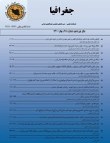The effective factors in delimiting maritime boundaries between Iran and Arab states in the Persian Gulf
Author(s):
Article Type:
Research/Original Article (دارای رتبه معتبر)
Abstract:
Extended AbstractIntroductionThe delimitation of maritime boundaries is one of the important steps in drawing sea boundaries. The delimitation of the maritime boundaries in the Persian Gulf region has a special geographical and legal complexity due to its shallow depth and breadth, the existence of islands and energy reserves. Iran delimited most of its maritime boundaries with the southern Gulf States in the 1960s and 1970s. The current study aims at expounding the factors affecting the delimitation of Iran's maritime boundaries with the Persian Gulf states. MethodologyThis research is fundamental in terms of purpose and is descriptive-analytical in terms of nature and method. Data are collected using library resources. Also, data are analyzed using qualitative and inferential methods. The present study also tries to provide a coherent analysis and interpretation of the factors affecting the delimitation of Iran’s maritime boundaries with reference to the Iran's maritime law provisions, Iran's boundary agreements with the of the Persian Gulf states, United Nations Convention on the Law of the Sea (UNCLOS), reports and reliable legal reference books and the claim of countries regarding the delimitation of maritime boundaries.. Results and DiscussionThe research findings demonstrate that geographical, legal, political and economic factors have played a role in delimiting Iran's maritime boundaries with its neighbors. Political and economic factors have played an indirect and motivating role in Iran's desire to delimit its maritime boundaries with its neighbors. The economic factors have played an important role in the Iran-Saudi maritime boundary (access to energy fields). However, geographical and legal factors have played a direct and decisive role in delimiting Iran's maritime boundaries. Among the geographical factors, the condition of the coastlines and islands of Iran have played a decisive role in the delimitations of Median Lines. Some geographical factors such as geological and geomorphological variables of the seabed did not play a role in delimiting the boundaries. Nevertheless, the role of these natural elements in the fluidity of energy reserves led to the emergence of buffer zones on the boundaries. Legal factors within the framework of the principle of Agreement, Equity and the Equitable Principle have played an important role in Iran's maritime boundary agreements with its southern neighbors. Among the legal elements, the Proportionality Principle has no place in the Iran’s maritime agreements, which has been mostly cited in courts and judicial decisions. Nonetheless, Iran can apply this principle to the rest of its maritime boundaries. ConclusionThe complexity of the equations of the maritime region of the Persian Gulf and the presence of extra-regional powers have had a profound effect on the boundary and territorial arrangements of the region. Iran has undefined boundaries in at least three of its maritime areas in the Persian Gulf, i.e. with the countries of Iraq, Kuwait and the United Arab Emirates. In Iran's maritime boundary disputes with the aforementioned countries, a range of different factors can be observed, and the settlement of boundary disputes is not possible only by relying on legal and geographical issues, although these two factors are influential in the field of practice; However, there is a need for political, economic and other factors to play a role in the settlement and boundary arrangements of Iran and the mentioned states in the form of an interwoven complex. Political factors should be considered in appropriate interactions and regional collective cooperation policy and away from the intervention of extra-regional powers and states; also, economic factors should be considered in the cooperation of neighboring states for fair exploitation of seabed energy resources.
Keywords:
Language:
Persian
Published:
Geography, Volume:20 Issue: 74, 2022
Pages:
187 to 209
magiran.com/p2528290
دانلود و مطالعه متن این مقاله با یکی از روشهای زیر امکان پذیر است:
اشتراک شخصی
با عضویت و پرداخت آنلاین حق اشتراک یکساله به مبلغ 1,390,000ريال میتوانید 70 عنوان مطلب دانلود کنید!
اشتراک سازمانی
به کتابخانه دانشگاه یا محل کار خود پیشنهاد کنید تا اشتراک سازمانی این پایگاه را برای دسترسی نامحدود همه کاربران به متن مطالب تهیه نمایند!
توجه!
- حق عضویت دریافتی صرف حمایت از نشریات عضو و نگهداری، تکمیل و توسعه مگیران میشود.
- پرداخت حق اشتراک و دانلود مقالات اجازه بازنشر آن در سایر رسانههای چاپی و دیجیتال را به کاربر نمیدهد.
In order to view content subscription is required
Personal subscription
Subscribe magiran.com for 70 € euros via PayPal and download 70 articles during a year.
Organization subscription
Please contact us to subscribe your university or library for unlimited access!


